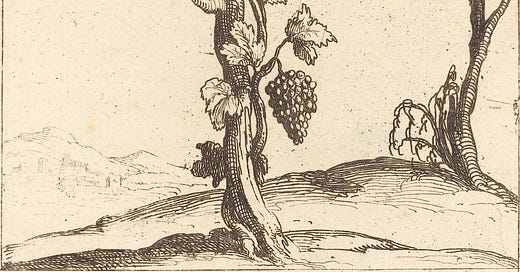On one occasion some early grapes were sent to Abba Macarius because he longed for them, and to give a proof of his abstinence, he sent them to another brother who was sick, and who craved for grapes; and having received them, he rejoiced over them greatly, and then he despised his desire, and sent them on to another brother, as one who had no wish for food of any kind, and who held his self-denial in contempt. Now when the brother had received the grapes, although he desired greatly to eat them, he did the same as the other brother had done, and no man wished to eat them. And after they had gone about among many of the brothers, the last one who received them sent them to the blessed Macarius as a gift of great honour; and when the blessed Macarius saw the grapes he marvelled at the extent of the self-denial of the brothers, and gave thanks to God, and he did not eat them.
—Sayings of the Holy Desert Fathers, pg. 26 (#86)
Reading the Desert Fathers has always been a bit of a two-edged sword for me. On the one hand, these monks held the love and mercy of God in such high esteem that even the casual reader could think that the doors of Sainthood—or at least salvation—are wide open because of how much love God has for His creation.
On the other hand, one could drift into despair if not careful due to the seriousness with which the Desert Fathers chastise sin, particularly their own. Obviously spiritual reading should lead us neither to prelest nor despondency, so what are we to do?
Unfortunately, I don't have the answer on how to avoid either of these pitfalls. Personally, I'm given much more towards despondency, and—coming out of Reformed Protestant education and theological formation—the “I am a worm and not a man” mentality than I am to thinking in vain that I'm the next St. Pachomius.
So while I can't offer any sound advice on avoiding such things (as if I'm qualified in the slightest), I can share the above story. At first, I laughed when I read it. It's a silly story about how a little grape vine goes uneaten. Yet wrapped in this story is a lesson about the community, a parable of self-denial, and an uplifting glimpse into the joy a spiritual father takes in his children.
A common theme with all the brothers, including St. Macarius himself is the desire for the grapes. We're told these grapes were harvested early, which means they were rare and desirable. Yet, each monk is more interested in their own asceticism than fulfilling their desire, so they pass on the grapes. What I find interesting is the communal aspect of this story. I feel that if this story are written today, the monks would complain that their brothers brother who gave them the grapes was tempting them to sin by fulfilling their desires, but we see none of this. Each monk was simply mindful of his own desire, rejected himself, and sent the grapes along the way. Finally, Abba Macarius gets the grapes again and rejoices in the successful ascetic struggles of the monks, gave thanks to God and promptly does not eat the grapes.
So a story which on the surface seems like a silly bit of food waste actually gives us multiple examples to live by. While most of us in the modern world are not at the level of fasting for multiple days at a time like the monks in the desert, we do deal with a world of abundance. We don't know what it means to have “early grapes” because we can have grapes affordably shipped across the word any time of year. But we do know what it means to look desire square in the face. We are bombarded by desire. Advertisements, comparing ourselves to our neighbors, constant social media notifications (you can turn them off, by the way, I highly recommend it) are the way of our world. Perhaps we can take a lesson from the brothers here and at the very least acknowledge how enslaved to our passions we are. Perhaps we can become aware of our own greed and, in time, deny ourselves the opportunity to feed it. Perhaps we can see the actions of others not as a constant barrage of threats against us, but as acts with their own motivations coming from individuals with their own passions to battle. Maybe, just maybe, the sour grapes our neighbor gives us are actually ones they thought were too sweet for them to behold themselves.




